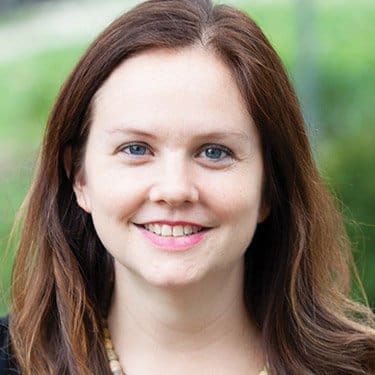A
A text came in this morning at 9:00 a.m. from my neighbour Wanda: “Any baby news yet from Emily?” I happened to be in the process of wrapping a tiny raincoat for the same expectant child. Without realizing Wanda was texting, my husband Ben asked, “Did Alex and Emily have their baby?” None of us know this couple well, but we can see their house from our front porches. Earlier this year we had noticed Emily’s figure changing from a size-2 waist to something else. During one of our happy-hour gatherings we were bold enough to yell across the street, “Emily, what’s new?” We cheered when she announced that her firstborn would come in winter.
It’s a curious thing that Wanda, in her sixties, and Ben and I, in our forties, are anxiously awaiting the birth of a baby by a couple we barely know. It reminds me of my surprise when, fourteen years ago, two different neighbours brought over handmade blankets for my firstborn. I had never met either of them, but I know now that they were watching my bump just as I am watching Emily’s, working on handmade gifts as I suffered through stretch marks and insomnia. At the time, I was touched but confused by their sweet gestures. The twenty-eight-year-old me wondered, “In a world where child-rearing is totally private, why do these folks care that I brought a baby home?”
Psychologists recently published a study of parenting in the Congo among the hunter-and-gatherer Mbendjele people. Here, children are cared for by an average of eight alloparents, or other parents. Instead of privatizing child-rearing, Mbendjele parents share both the joys and the responsibilities of helping newborns grow from helpless beings to contributing members of society.
My own children have been raised in what, at least for white Americans, is an unusually large community. I co-founded Lydia’s House, a Catholic Worker house that invariably enmeshes our family in all kinds of comings and goings. We are also in a loose intentional community with some of our neighbours. We see our extended family often. But even so, reading the study, I found myself getting jealous of the Congolese parents and their children. After blankets were dropped off for baby Annie fourteen years ago, I rarely saw our gift-giving visitors, probably because I bought into a private parenting narrative and didn’t bother to remember their names. I look back on the winter of 2009 as a lonely and depressing one, marked by walking at the mall.
It was in the context of this “do it yourself” ethos that Ben and I decided that three children was the max we could handle. We could house three, educate three, and suffer the indignities of discipline with three. Our child-bearing years corresponded with the Obama presidency, and our circle of Christian friends became increasingly progressive and secular. With pressures of work-life balance, private Montessori schools, attachment parenting, and the complexities of urban living, three new humans in our care seemed even a bit excessive. Months after our youngest was born, Donald Trump was inaugurated. A childless friend told me, “This is why I’m not having children.” Separately, my father said, “I’m glad I won’t be around to see what a mess my generation made of the future . . . but your kids will be!”
My thinking around whether children are a good idea triangulates between the excitement I share with Wanda as she and I gaze out our front windows for signs of a baby, my readings on societies where children and their needs are shared by a larger community, and anticipated apocalypse. It seems that many of us implicitly feel that children are a good idea and hope they are born, even if we wouldn’t lay this hope out logically. There’s just something timeless—perhaps primordial—about the weary rejoicing when a baby shows up.
A lesson recently taught me by Other Feminisms scholar Leah Libresco Sargeant is that we were all once children, so we all have a responsibility to children. The lesson my soul is teaching me as the people of Carter Avenue gaze out the front window for signs of a neighbour’s baby is that we do want children to come into the world, our neighbourhoods, and our churches, even if they are messy, loud, and time-consuming.
As individuals, most of us maintain a localized hope for babies, but when it comes to those “powers and principalities” that shape a cultural mood, we assume burden before gift.
But somehow our sentiment toward children as a collective has soured. As I’ve longed for more support in my own child-rearing and wondered why we don’t have eight alloparents, I’ve concluded that American society is skeptical of children. As individuals, most of us maintain a localized hope for babies, but when it comes to those “powers and principalities” that shape a cultural mood, we assume burden before gift. Children on a macroscale have become a consumer decision, a luxury item not unlike an expensive mortgage or a Tesla: good for you if you can afford them, but don’t ask for help with that. The result is a collective lack of willingness to sacrifice for children that are not our own. Adults-only communities are popping up across America; my dad lives in one. At my affluent, mostly white, social-justice-speaking Catholic church, church staff make regular pleas for people to work in the nursery. They have trouble filling the slots even though they pay people to do the work.
As self-fulfillment, leisure, and personal accomplishment become the water many in the upper middle class swim in, it’s no wonder that both the affluent and the aspirational think children will be a slog. I’d argue that for any woman to wholeheartedly say yes to children, even as more and seemingly better things can be done with time and money, we all need to say a wholehearted yes to children.
Of course, this doesn’t mean that I should have ten children, or that you should have any at all. Saying yes to children doesn’t mandate freezing eggs to guarantee later fertility or engaging in any number of challenging things to have your own biological children. Saying yes to children means celebrating every new life, planned or unplanned, and understanding that our work as humans has always involved caring for children, whether ours or someone else’s. It isn’t my job simply to keep my children in my house or in a school for careful instruction, supplemented by time playing in fenced-in parks. The childless person isn’t to be relegated to evening silence while devoting their margin to entertainment and travel and lamenting the noise and taxes associated with other people’s children.
Our best life, I’d argue, looks more like the community in Congo, where reporting shows a smaller footprint in life and less emphasis on worldly accomplishment. I imagine this different value system and relationship to physical space creates more slack: more time to say yes to formal child care and yes to informal relationships with children one knows and cares about.
As I consider what a better way might look like here in Cincinnati, I’m reminded of a new couple who are living and working with Lydia’s House. Having spent their formative years at an intentional community called Jesus People USA in Chicago, they became accustomed to children roaming in and out of their apartment. When they moved into our neighbourhood, they wanted to show my children their musical instruments, build scale models of houses with my architecturally interested seven-year-old, and drop off granola for my kids’ breakfast. They aren’t formal or paid child-care providers for us, and their own children are in college, but they are enriching and concerned adults. I hope my children, too, enrich them and keep them agile as they experiment with the freedom of their post-child-rearing years. Wanda, my baby-gazing neighbour, also shows me glimpses of another way, using my children as tasters for her recipes and inviting them to play Uno. My husband helps her move heavy things, and I bring her items from our food-pantry excess. This network is not perfect, but had I experienced these small examples of the beloved community earlier in life, and known support to be consistent and reliable, I would have considered a larger family. If support and shared care were the norm, not the exception, I think many more well-off young women would think children are a good idea.
While I lament the affluent’s choice to privatize children, the loudest alarm bells go off in my mind when I see the poor shamed for having them at all. In over a decade of co-directing Lydia House, many adults of varying political and religious persuasions have suggested to me that the women we help—or the men who father their children—should receive forced or compensated sterilization. In an age of contraception, we assume that those who can’t afford children should forgo them. After all, if these women don’t have houses, why are they having babies?
But something deeper is going on than poor planning or contraceptive sloppiness. What I’ve learned in doing this work is that children are one of the few ways that women in our circle of care have of saying yes to the goodness of life and relationships. Indeed, they are often excluded from the things of the “good life” and cut off from healthy relationships; approximately 40 percent of guests at Lydia House spent time in foster care growing up, and half of them have experienced domestic violence in the last year. Children create family and meaning and bring joy. When all other trappings of the world are wiped away by material poverty, this truth seems to rise up.
Everybody wants a revolution but nobody wants to work in child care.
In the early years of helping to shepherd this community, I often marveled when my co-worker Meridith, herself childless and offering her margin to these families, would rejoice at the announcement of a coming child. As she’d proclaim “I’m so happy for you,” I’d sneer at the mother-to-be in the background, thinking only of the costs. It was humbling, then, when I told Meridith of my own third pregnancy, seemingly superfluous (I already had a boy and a girl) and no doubt a tax on our fragile organization. She offered her typical joy and remained supportive even as I developed severe complications and was out of commission for months. In the end we welcomed a child who is a true community kid, a total extrovert, and a best friend to many children who have lived at the shelter.
I know of another Catholic Worker couple discerning marriage and debating whether they can and should welcome children. The man feels that children will distract him and his bride from the work itself: serving in the soup kitchen, writing, labour organizing. I can’t answer for them whether they should bear children, and of course biology will play a role in determining their path. What I did say, though, when he asked my opinion, is that our choice to have children will never stop the Kin-dom from coming; indeed, all signs point to the fact that having children will help it on its way. You may conclude that children are not for you personally to bear, as many saints and monastics have, but you need not conclude that children are a bad idea. That conclusion leaves mothers isolated, the childless devoid of the joy that comes from proximity to children, and children themselves without the beloved community that God intended for them.
Dorothy Day once said about community life, “Everybody wants a revolution but nobody wants to do the dishes.” Since I spend my life supporting women with toddlers, I might edit that to say, “Everybody wants a revolution but nobody wants to work in child care.” Consequently, our little revolution at Lydia’s House includes stints of child care for everyone! We also make a point to bless every baby born and to celebrate each new mother with a ritual and gifts. Our circle of care includes ongoing support for mothers after time in shelter, and we have a Wednesday-night family program of children’s catechesis for three- to twelve-year-olds. As I teach the kids in our circle about the life of faith, we always linger on the Bible story of the visitation—the visit of a newly pregnant, teenage Mary with her older, more pregnant cousin Elizabeth. Our clay models show Elizabeth filled with joy as she touches the belly of Mary. I’m struck that a visit between these women is a story that we all should know and remember in the church and the liturgical year. Perhaps it is because the need for support in pregnancy, for joy at one’s expectant state, is a timeless feature of the human experience. I’d like to think the Scripture writers knew, and my church (at its best) endorses, that every baby deserves a celebration and every mother supportive companions.



